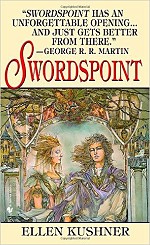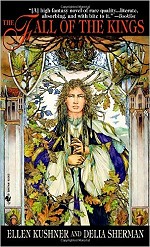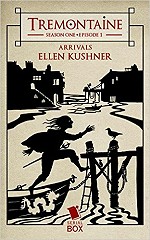Summer 2015-6
Unintended Invention
The Fantasy of Manners
I did not intend to invent the "Fantasy of Manners." I wasn't even sure that Swordspoint was fantasy. I began my first novel in my 20s, when "fantasy" still meant either elegant little antique curiosities like Lud-in-the-Mist, or great big outdoor epics involving treks through forests, snow and maybe a big cave that imitated The Lord of the Rings. My friends and I devoured them all.

But great fantasy must tell a personal truth: that's what gives it power. Tolkien's Mordor was forged by his time in the trenches of the Somme, and his Shire by his rambles in the sweet English countryside. In the 1980s, many of us aspiring fantasy writers lived in black leather jackets and blighted cities, paying low rent in formerly gorgeous housing now crummy, run down and cheap; architectural splendor still hanging by a thread, and keep your keys stuck between your knuckles when you walk home at night, in case anyone tries to mess with you. We desired Middle Earth and Earthsea with a great desiring -- but when we tried to write our own versions, it came up false. They were our dreams, but they'd been dreamt by someone else. That wasn't our real world.
Our world had sweaty rock clubs, and the Pre-Raphaelite art revival, a poster in every dorm room. It had Sarah Crewe in a garret telling stories to a starving servant girl, and pre-AIDS glamorous outlaw gay men; Richard Lester's Beatles movies and his The Three Musketeers, and it had Oscar Wilde, and Georgette Heyer's exquisite, hilarious social comedies set in her world of Edwardian-inflected "Regency Romance" (famously called by Cynthia Heimel "Bertie Wooster for girls!"); it had those boon companions Rocky and Bullwinkle, Napoleon Solo and Ilya Kuryakin, Fafhrd and the Grey Mouser, Sherlock Holmes and Dr. Watson, Butch and Sundance . . . and it had Angela Carter and Joanna Russ.
Put in a pot, heat, stir, type it up on fancy paper -- and expect no one to buy your novel or understand why you'd written it.
I hedged Swordspoint 'round with warnings that I was messing with tradition. The fairy tale scene it opens with is a sham, concluding:
But there is no one behind the broken windows . . . No king rules them any more . . . And already this morning more than one drop of blood has been shed.
And then, just to be sure, I mocked my style before anyone else could do it, titling my book: Swordspoint: a Melodrama of Manners.

I was afraid it really was a melodrama, see, or that it would be taken for one: that because I felt passionate about my characters and they felt passionate about everything -- much as they try to hide it -- and because my novel featured petty evil rather than grandeur, little human drawing room interactions instead of great outdoor battles, I had somehow gone over the edge of what was acceptable. I was afraid the book wouldn't sell.
And it didn't, really. Many editors, both fantasy and mainstream, turned it down. When it was finally published by David Hartwell at Arbor House, it was a critical success; it got amazing blurbs like "it's as if Noel Coward had written a vehicle for Errol Flynn" (Gene Wolfe), it inspired heated debate on whether a "fantasy" with no magic could be considered fantasy at all . . . Swordspoint slowly grew as an underground classic, but I doubt it ever made any publisher much money.
I wasn't the only such writer of my generation. I just happened to be the first to publish in what soon became a little genre all its own, with books written by Steven Brust and Emma Bull, Farren Miller and Elizabeth Willey and many, many more. We didn't agree to do this; it just happened.
In 1826, Sir Walter Scott -- the huge romantic sword-swinging fantastical historical novelist of his day -- wrote in his journal:
[Jane Austen] ha[s] a talent for describing the involvements and feelings and characters of ordinary life, which is to me the most wonderful I ever met with. The Big Bow-wow strain I can do myself like any now going; but the exquisite touch, which renders ordinary commonplace things and characters interesting . . . is denied to me.
We had, without meaning to, turned our backs on the Big Bow-wow, in favor of a sort of Chamber Fantasy, set not in an imagined middle-ages of armor and great halls, but in later periods, where wit and manners made or broke someone's fate. Maybe because we'd been socialized in the 60s, we were fascinated with how that strange and alien thing, propriety, was like magic: learn its rules, and you'll succeed in the grown-up world; break them, and you'd better be better than everyone else, or have powerful allies!
In 1991, my colleague Donald G. Keller decided to write a critical piece about us. Instead of the term he initially used, which I disliked, I suggested he call the style "fantasy of manners"--which, when his piece came out, some wags quickly nicknamed manner-punk.
Now, of course, "Fantasy of Manners" is a recognized genre, even though people may disagree on its precise definition -- which shifts with the tides of new novels and new influences, as it should.

And this is where I admit that I neither know nor care what category my work fits into. To me, a novel is a novel, and marketing is marketing, and the twain shall inevitably meet, and it has to be called something. Although I yearned not to be ghettoized with my first novel, I realize now that I was insanely lucky to be published in genre. The mainstream readers I lost because my work has Fantasy Cooties are nothing compared to the ones who devour the Riverside world and have an endless appetite for more; who still argue about what makes it fantasy ("the flavor!" someone once explained), readers who make drawings and write fanfic and even cosplay my characters.
Which is why I think the world is ready for Tremontaine -- and why there are enough other authors I respect to join me in writing about my Swordspoint world.
The world of fantasy readers continues to get bigger -- and less fussy about labels. Even mainstream kids now grew up on the magic of Harry Potter -- and on endless remakes of Jane Austen. The world is a lot safer for us fantasists of manners than it was when our works were originally created. I believe the existing fans will love Tremontaine, and will glory, as I do, in the opening up of my world to some of the sharp, funny, wise and insightful younger voices writing today. But it's just as exciting for me to think that the groundwork has been laid, and that Fantasy of Manners has finally come into its own.

Ellen Kushner unites her talents and insights as a writer, performer, and cultural maven in one sleek package: she is the author of acclaimed works of literary fantasy, an award-winning audio book narrator and stage performer, the creator and former host of public radio's national series Sound & Spirit, and a popular teacher and lecturer.
Also in this series
The Immortal Enduring Vampire by Rhiannon Frater
Get Ready Cyberfunkers: Black Science Fiction by K. Ceres Wright
Defining Horror by Jeani Rector
Steampunk: A Marvellous Excursion by Michael Pryor
Female Private Eyes in Fiction: From Lady Detectives to Hard-Boiled Dames by Colleen Collins
The Good, the Bad and the Ugly: Western Writing by Julia Robb
Grand Tradition Science Fiction: Stories that Want to Have Fun, by Bascomb James
Unintended Invention: The Fantasy of Manners, by Ellen Kushner
For posts about Melbourne events, places, news, reviews, giveaways, see our Facebook Page:






 Published in Melbourne, Victoria, Australia
Published in Melbourne, Victoria, Australia